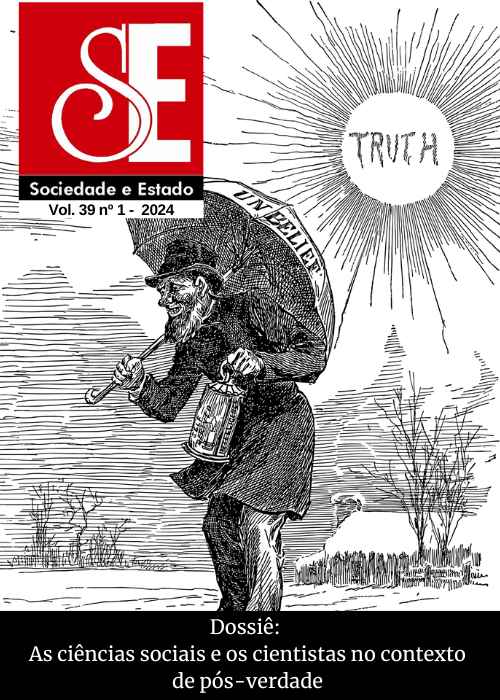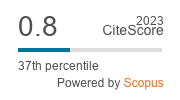Pós-verdade ou pós-acadêmico: a transformação da ciência e a obsolescência da "realidade"
DOI:
https://doi.org/10.1590/s0102-6992-20243901e51306Palavras-chave:
pós-verdade, objetividade, explicação sociológica, Mauss, práticasResumo
As discussões sobre a pós-verdade apelam geralmente para uma noção de ciência como objetiva e, portanto, não ideológica. A objetividade foi, contudo, atacada como sendo, em si, uma ideologia, desenvolvendo-se nesse contexto uma ampla literatura sobre a existência de “epistemologias” alternativas capazes de revelar fatos que essa ideologia excluiria. O foco na questão do que é um fato leva à “pós-verdade”: essa questão, por sua vez, é tratada como ideológica. Mas isso é enganoso por duas razões. Por um lado, os tipos de fatos que supostamente seriam acrescentados por essas epistemologias alternativas fizeram sempre parte da sociologia. O desacordo não é, nesse sentido, sobre fatos, senão sobre a afirmação da validade dos pontos de vista. Por outro lado, a sociologia problematiza a ideologia como tal, sem afirmar nenhuma ideologia. Neste contexto, a abordagem aqui proposta oferece seu próprio enquadramento: passamos a compreender o que algo como “opressão” pode vir a significar – e o que significa para as pessoas envolvidas –, em termos da diferença entre nossas suposições e práticas, enraizadas na nossa forma de vida, e as delas.
Downloads
Referências
BELLAH, Robert. Habits of the heart: Individualism and commitment in American life. Berkeley: University of California Press, 1985.
BOON, James A. Other tribes, other scribes: Symbolic anthropology in the comparative
study of cultures, histories, religions, and texts. Cambridge: Cambridge University Press, 1982.
BROWNLEE, Fred. Preface, in: JOHNSON, Charles S.: To stem this tide: A survey of racial tension areas in the United States. Boston and Chicago: The Pilgrim Press, 1943.
BRUNSMA, D.L. and J.P. WYSE. “The possessive investment in White sociology”. Sociology of Race and Ethnicity, v. 5, n. 1, pp. 1-10, 2018.
DENNETT, Daniel C. Darwin's dangerous idea. New York: Simon & Schuster, 1995.
DUBOIS, W.E.B. The Philadelphia Negro: A social study. New York: Schocken Books, [1899]1967. https://archive.org/details/philadelphianegr001901mbp
FREEMAN, Derek. Margaret Mead and Samoa: The making and unmaking of an anthropological myth. Cambridge, Mass.: Harvard University Press, 1983.
GEERTZ, Clifford. “Thick description: Toward an interpretative theory of culture”, in: The interpretation of cultures. New York: Basic Books, 1973. https://philpapers.org/archive/geettd.pdf (accessed 15 June 2021)
HARDING, Sandra S. “How standpoint methodology informs philosophy of social science”, in: S.P. TURNER and P. ROTH (eds.). The Blackwell guide to the philosophy of the social sciences. Hoboken, NJ: Wiley Blackwell, 2003. https://doi.org/10.1002/9780470756485.ch12
HARDY, H. In search of Isaiah Berlin: A literary adventure. London: Taurus Parke, Bloomsbury Pub., 2018.
JOHNSON, C. S. Patterns of Negro segregation. New York: Harper Row, 1943.
KUCKLICK, Henrika. “History of Anthropology”, in: BACKHOUSE, R. E., and P. FONTAINE (eds.) A historiography of the modern social sciences. Cambridge, New York: Cambridge University Press, 2014.
LADNER, J. (ed.). The death of white sociology. New York: Vintage, 1973.
LÉVI-STRAUSS, Claude. Introduction to the work of Marcel Mauss, trans. F. BAKER. London: Routledge: Kegan Paul, 1967[1950].
LYND, R. S., and H. M. LYND. Middletown: A study in American culture. New York: Harcourt Brace & Co., 1929.
MACLEAN, V.M. and J.E. WILLIAMS MacLean, Vicky M., and Joyce E. Williams. “Shifting paradigms: sociological presentations of race”. American Behavioral Scientist, v. 51, n. 5, p. 599–624, 2008.
MANNHEIM, K. “Conjunctive and communicative thinking”, in: D. KETTLER, V. MEJA, and N. STEHR (eds.), trans. J. J. SHAPIRO and S. WEBER NICHOLSON. Conservatism: A Contribution to the sociology of knowledge. London: Routledge and Kegan Paul, [1924]1986.
MANNHEIM, K. Ideology and utopia: An introduction to the sociology of knowledge, trans. L. WIRTH and E. SHILS. New York: Harcourt Brace & Company, [1929]1936. https://archive.org/details/ideologyutopiain00mann (accessed 16 November 2020)
PUTNAM, Robert. Bowling alone: The collapse and revival of American community. New York: Simon and Schuster, 2000.
RIESMAN, David. Individualism reconsidered, and other essays. Glencoe, IL: Free Press, 1954.
RIZVI, Sana. ”Racially just epistemologies and methodologies that disrupt whiteness” International Journal of Research and Method in Education, v. 45, p. 225-231, 2022a.
RIZVI, Sana. “Racially just epistemologies and methodologies that disrupt whiteness II” International Journal of Research and Method in Education, v. 45, p. 323-329, 2022b.
ROUSSEAU, J.J. The social contract and other political writings, trans. Q. HOARE, ed. C. BERTRAM. London: Penguin, [1762]2012.
STAPLES, R. Introduction to Black sociology. New York: McGraw-Hill, 1976.
THERNSTROM, Stephan. “‘Yankee City’ revisited: The perils of historical naïveté”.
American Sociological Review, v. 30, n. 2 (Apr), p. 234-242, 1965.
TURNER, Stephen. Sociological explanation as translation. Rose Monograph Series of the American Sociological Association, New York, Cambridge: Cambridge University Press, 1980.
TURNER, Stephen. 1984. La Explicación Sociológica Como Traducción, trans. M. USABIAGA; Preface by J.P. MAYER. México: Fondo de Cultura Económica, 1984.
WAQUANT, Loïc. “Scrutinizing the street: Poverty, morality, and the pitfalls of urban ethnography”. American Journal of Sociology, v. 107, n. 6, p. 1468-1532, 2002.
WAX, Murray L. “Tenting with Malinowski”. American Sociological Review, v. 37, n. 1, p. 1-13, Feb. 1972.
WEBER, Max. “‘Objectivity’ in social science and social policy”, in: H. H. BRUUN and S. WHIMSTER (eds.) Max Weber: Collected methodological writings, trans. H. H. BRUUN. London/New York: Routledge, [1904] 2012.
WEBER, Max. The Protestant ethic and the spirit of capitalism, trans. T. PARSONS. New York: Charles Scribner’s Sons, [1930]1958.
ŽIŽEK, S. “The real reason why the Taliban has retaken Afghanistan so quickly, which Western liberal media avoids mentioning”. RT 17 August, 2021.
https://www.rt.com/op-ed/532207-zizek-taliban-retake-afghanistan-reason/
Downloads
Publicado
Como Citar
Edição
Seção
Licença
Copyright (c) 2024 Sociedade e Estado

Este trabalho está licenciado sob uma licença Creative Commons Attribution 4.0 International License.











